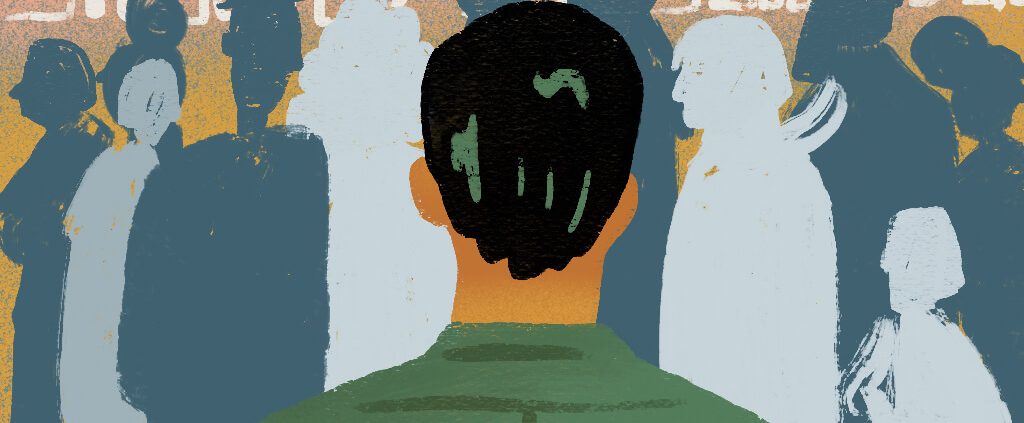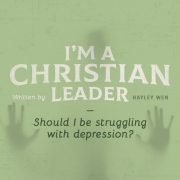Coping with Mental Health From a Culturally Different Background
Written by Joseph Kolapudi, Australia
Growing up as a South Asian in a Christian family in Australia, I often felt a tension between my identity and the challenges I faced at home, compared to my life outside of those walls—both literally and figuratively.
When I realised that my friends, peers, and even church mates viewed me as “the other”—someone different to the dominant culture, whose cultural identity was different from the norm—this began to change me, in several ways.
Firstly, I began to see myself as intrinsically different, and started to disassociate myself from friends. Secondly, I started to view those around me as “Australian”, and myself as an Indian, separated by cultural values, attitudes, and beliefs.
Growing up as “different” in Australia
My parents held firm to their cultural background in everything they said and did. So for me, growing up in a household where being culturally different was encouraged and expected made it difficult to acclimatise to the vastly different culture of the world around me.
Living in Australia, in a multicultural neighbourhood, I saw differences everywhere—from language, to religion, to the way emotions were displayed, or hidden.
For children of Asian migrants, we were taught to keep our emotions hidden, never to be expressed, unless it was necessary. This stood in contrast to the dominant Australian culture which encouraged outward expressions of internal emotions. Learning to express my personal emotions, especially the extremes of uncontrollable anger or deep sadness, were neither welcomed nor tolerated, making it even harder to know when to display such feelings, if ever.
So, like most migrant children, I stuffed my emotions down, never questioned them, and never explored them.
Until, one day, my long-sealed emotions bubbled over, and I was forced to deal with it.
My first encounter with mental health challenges
Shortly after finishing my undergraduate degree, I encountered mental health challenges for the first time. I had just graduated and had a wonderful feeling of relief and elation after finishing up three gruelling years of university. Unfortunately, my parents’ reaction was one of undue expectations. They wished for me to make a decision about work or further study. Their primary concern was about my future. I was to either continue with my higher education in business—a degree I no longer wanted to pursue—or to find gainful employment. For them, higher learning somehow equated to success. I, on the other hand, just wanted to enjoy the moment.
I felt a rising indignation internally. I was no longer satisfied with fulfilling anyone’s expectations, other than my own. This eventually manifested in anger, and I would storm out on my parents, and not return home for hours on end.
Most of these outbursts continued as I attempted numerous times to convince my parents of my own choices, but to no avail. My parents seemed to be unfazed about my personal choices, and my outbursts didn’t seem to help. I had my heart set on missions, but in their eyes, my calling was “impractical” and “unrealistic”.
Their outlook on my life choices began to change over time, and my parents began to understand my temperament on matters that dealt with my own outlook on future decisions. Yet they could not fully comprehend the impact this episode would have on my personal emotions later in life.
My initial emotional outbursts became more suppressed over time, and feelings of disappointment, personal failure, frustration, anxiety, and discontentment bubbled beneath the surface. Even though my parents understood where I was coming from, they silently distanced themselves from the issues I was facing, and tried their best not to trigger my outbursts themselves.
These outbursts had a negative impact on my ability to make decisions, where I was making decisions in the heat of the moment, rather than thinking through the repercussions of my actions.
It was only years later, and after several of these emotional breakdowns, that I finally sought professional help—though not in the way I initially expected.
The day I sought professional help
For several months in the lead-up to moving to the USA, my parents struggled to accept my decision to study theology, which had been my dream for years. They wanted me to follow my father’s footsteps into business, though I had no real interest in doing so. After I was accepted into seminary and provided with a scholarship to the States, they finally relented, somewhat reluctantly, and I made my move to California.
After I had landed in Los Angeles, I thought I had finally “made it”. I was studying a degree that I had chosen, at my favourite school, working on campus and living right across from campus.
Shortly after I graduated from my two-year master’s program, I started work with a Christian research agency, and there was an in-house counsellor available for confidential counselling sessions. Of course, I wasn’t interested. Having grown up in a culture where I had been taught that mental health issues were only experienced by those who had a weak mind, limited composure, or some sort of disability, I didn’t think I could be affected.
However, I was finally persuaded by my supervisor, who confided that he also was seeing a counsellor. So after weeks of stalling and deliberation, I decided that I should at least attempt to attend one session, since they were offered as a complimentary option for staff. Waiting in the foyer of the counselling office was one of the most disconcerting feelings I had ever experienced. I was there of my own free will, and this made me feel very vulnerable. But when I finally made it into the counsellor’s office and started to talk, I realised that it was more like having an everyday conversation with a close peer, not a trained professional, and that made all the difference.
The biggest piece of advice that I received in those initial counselling sessions was learning that expressing my inner emotions was better than enclosing them within my own heart. In my counsellor’s words, “Keeping your emotions hidden eventually leads to an internal implosion, which is worse than an external explosion”.
It was not easy hearing those words, but I knew my counsellor was right, and that having our feelings bottled up inside is more detrimental than if we expressed them openly.
It took a while, but I managed to gain enough courage and confidence in my self-worth and my personal experiences of mental health, to the point where I began sharing my story one-on-one with trusted peers, then at my home church, and now, in front of large audiences at conferences and speaking engagements as well.
Sharing my journey with others
Today, I serve as Multicultural Ambassador with the Mental Health Foundation Australia.
When I first heard about the opportunity to step into the role with the MHFA, I had no idea what it entailed and how I could use my own mental health journey to serve my local community. However, as I joined others in the foundation, I found that it was an opportunity to share my view on mental health in a safe space with others who had lived experience, as well as to gain the tools and courage necessary to share my story in other safe spaces in wider society.
If I had to offer one piece of advice to people going through similar situations, I would say that mental health is not something to be experienced alone. Finding a close confidant or companion that journeys with you, whether a friend or a counsellor, mentor or even a trusted peer can be vital in learning to handle your emotions in a healthy way.
I came to realise that God is in control of every circumstance, and He cares for us, His creation. Life is meant to be experienced with all its ups and downs, and it is only when we understand that, that we can live without fear or regret.
Looking back on my journey, it’s amazing how God used my time overseas to address the state of my mental health. Though I once thought that “escaping” would help my situation, I now see that God was leading me to face my fears on a personal level. Through the people and circumstances in my life that led me to accept the challenges and face the results, I have come to know that I am more than able to handle what comes my way, through God’s enabling and helping hand.
Back to HomepageBack to Homepage











Leave a Reply
Want to join the discussion?Feel free to contribute!